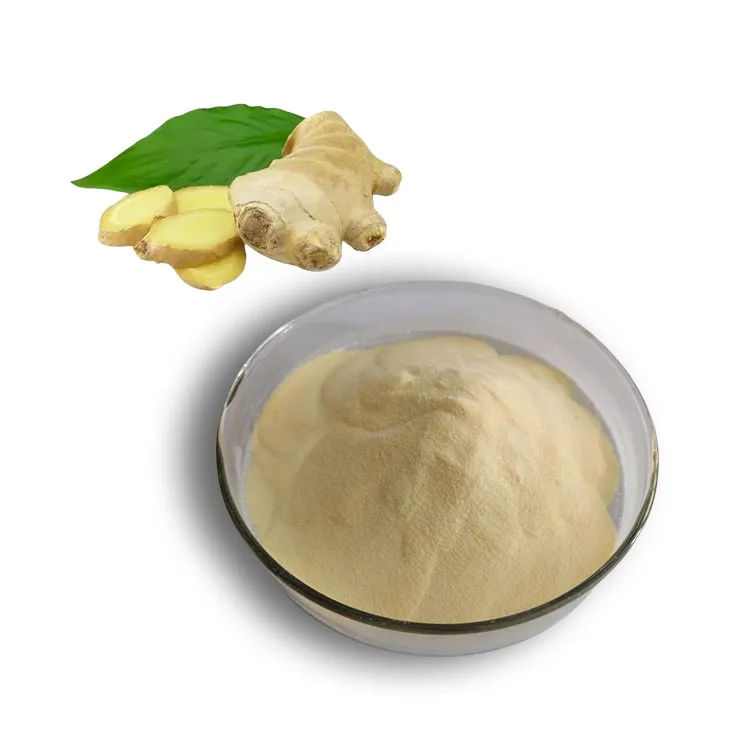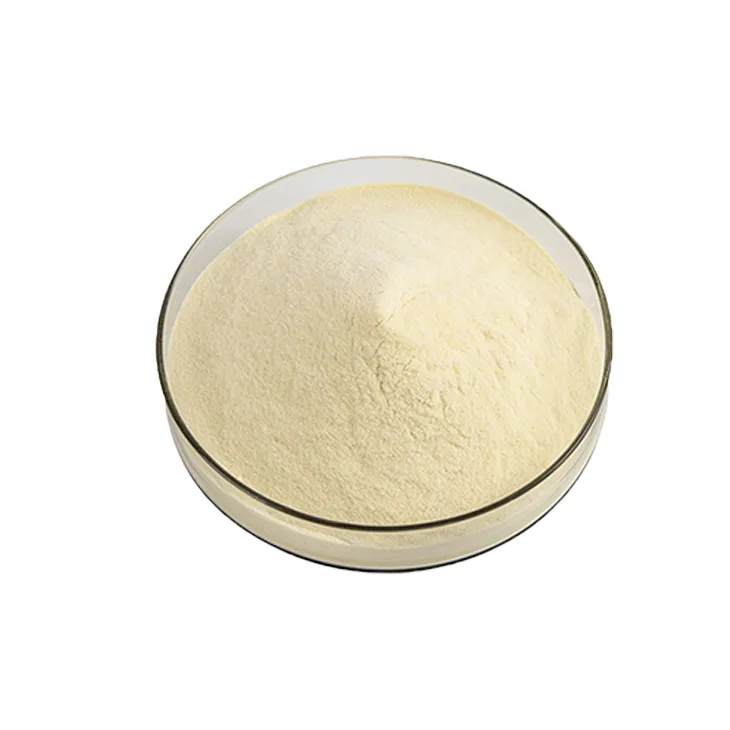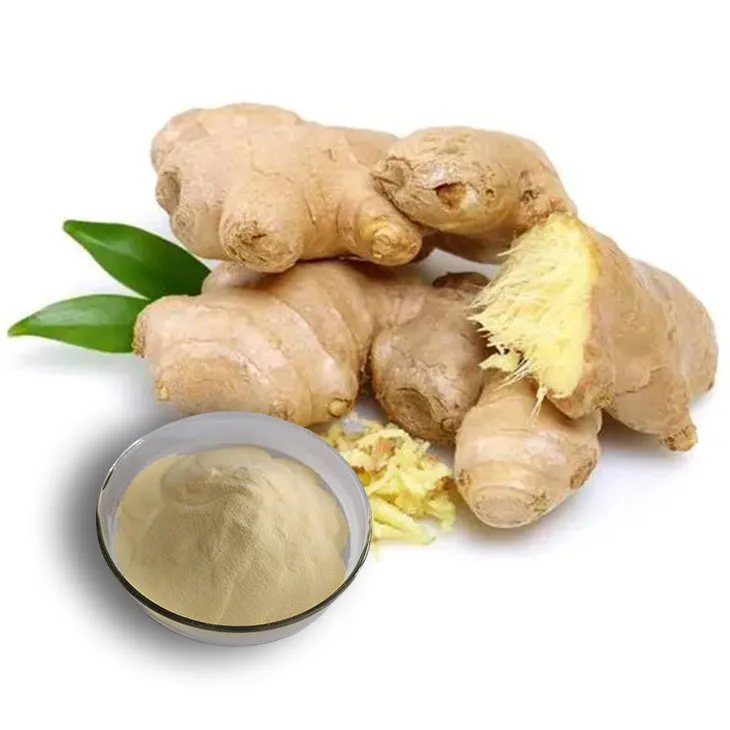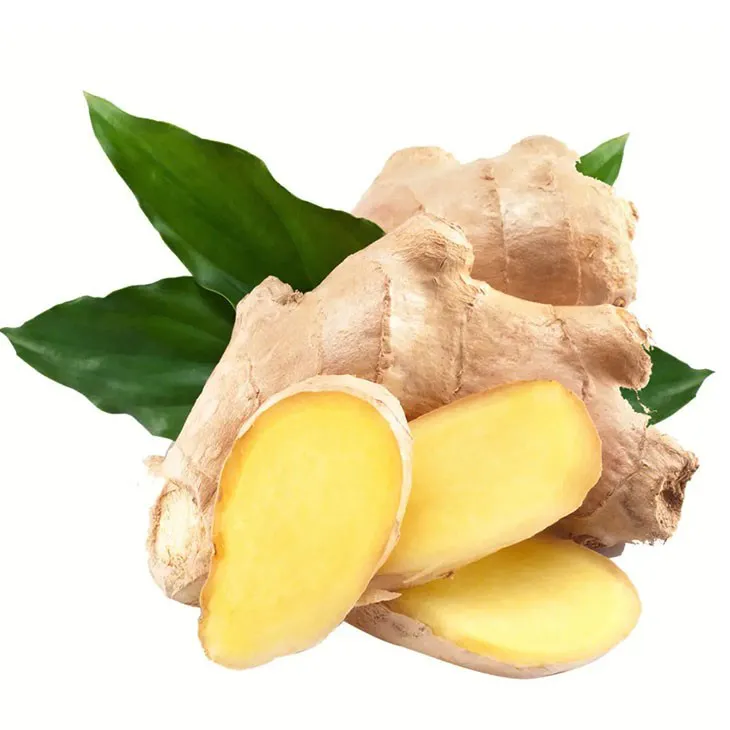- 0086-571-85302990
- sales@greenskybio.com
Organic Ginger Extract: A Fine Flavoring Agent for Food Manufacturers.
2024-11-06

1. Introduction
In the highly competitive world of food manufacturing, the choice of flavoring agents plays a crucial role in determining the success of a product. Organic Ginger Extract has emerged as an outstanding option for food manufacturers. Ginger has been used for centuries in cooking and traditional medicine across different cultures. Its extract, which is a concentrated form of the plant's essence, brings a wealth of benefits to the table.

2. The Flavor Profile of Organic Ginger Extract
Organic Ginger Extract contains a complex blend of compounds that contribute to its unique flavor. The primary compound responsible for ginger's characteristic taste is gingerol. This compound gives ginger extract a spicy, pungent, and warm flavor. However, it is not just the spiciness that makes it appealing. There are also undertones of citrusy, earthy, and sweet notes in the extract.
When used in food, it can transform the taste profile of a dish. For example, in baked goods like gingerbread, the extract provides a warm, spicy flavor that is both comforting and indulgent. In savory dishes such as stir - fries or curries, it adds a depth of flavor that cannot be replicated by other seasonings.

3. Applications in Traditional Food Recipes
3.1. Baked Goods
Gingerbread, as mentioned earlier, is a classic example of a baked good that benefits from organic ginger extract. The extract is a key ingredient in creating the signature flavor of gingerbread. It also pairs well with other traditional spices like cinnamon, nutmeg, and cloves. In addition to gingerbread, cookies, cakes, and muffins can also be enhanced with the addition of ginger extract. For instance, a lemon - ginger cake, where the citrusy notes of lemon are complemented by the spicy warmth of ginger extract, creates a delicious and unique flavor combination.
3.2. Sauces and Dressings
In the world of sauces and dressings, ginger extract can be a game - changer. In Asian - inspired sauces, such as teriyaki or sweet - and - sour sauce, it adds a layer of complexity. The spiciness of the extract balances out the sweetness of the sauce, creating a more well - rounded flavor. In salad dressings, a ginger - based dressing can add a zesty and refreshing touch. A simple ginger - soy - vinegar dressing can transform a plain salad into a flavorful and healthy meal.
3.3. Beverages
Ginger has long been used in beverages, and its extract is no exception. Ginger ale is a well - known drink that can be made even more flavorful with the use of organic ginger extract. The extract can also be added to tea, both hot and iced. A ginger - lemon - honey tea is a popular choice for its soothing and invigorating properties. In the world of alcoholic beverages, ginger extract can be used to create unique cocktails. For example, a ginger - mojito, where the freshness of mint is combined with the spiciness of ginger extract, offers a new take on the classic mojito.

4. Innovations in Food Recipes with Organic Ginger Extract
With the increasing demand for novel food experiences, food manufacturers are constantly looking for ways to innovate. Organic ginger extract provides an excellent opportunity for this.
4.1. Fusion Cuisine
In fusion cuisine, ginger extract can be used to bridge different culinary traditions. For example, in a Japanese - Mexican fusion dish, ginger extract can be added to sushi rolls with a Mexican - inspired filling. The spiciness of the ginger can complement the bold flavors of Mexican ingredients like jalapenos or avocado. Similarly, in an Italian - Asian fusion pasta dish, ginger extract can be used in the sauce to add an unexpected twist.
4.2. Functional Foods
The health - promoting properties of ginger are well - known, and by using organic ginger extract in functional foods, manufacturers can target health - conscious consumers. For example, in energy bars or protein shakes, the addition of ginger extract can provide a natural boost of energy and aid in digestion. In gluten - free or vegan products, ginger extract can be used to enhance the flavor without relying on animal - based or gluten - containing ingredients.
4.3. Gourmet Snacks
Gourmet snacks are becoming increasingly popular, and ginger extract can be used to create unique and high - quality snacks. For example, ginger - flavored popcorn, where the extract is used to coat the popcorn kernels, offers a spicy and addictive snack. Ginger - infused nuts, such as almonds or cashews, are also a great option for those looking for a healthy and flavorful snack.

5. Meeting Consumer Preferences
In today's market, consumers are more conscious about what they eat. There are two major trends that organic ginger extract caters to: health - consciousness and environmental - friendliness.
5.1. Health - Conscious Consumers
Ginger has numerous health benefits. It has anti - inflammatory properties, aids in digestion, and can help relieve nausea. For health - conscious consumers, products flavored with organic ginger extract are not only delicious but also potentially beneficial to their well - being. For example, a ginger - flavored yogurt can be a great addition to a healthy diet, providing both probiotics and the health - promoting properties of ginger.
5.2. Environmentally - Friendly Consumers
The organic nature of ginger extract is appealing to environmentally - friendly consumers. Organic farming practices reduce the use of pesticides and fertilizers, which are harmful to the environment. By choosing products with organic ginger extract, consumers can support sustainable agriculture. Additionally, many consumers are also interested in products that are locally sourced. Ginger can be grown in many regions, and by sourcing it locally and turning it into extract, food manufacturers can appeal to consumers who prefer local and sustainable products.
6. Quality and Purity Standards of Organic Ginger Extract
The organic label on ginger extract ensures a higher quality and purity standard. Organic farming regulations require strict control over the use of chemicals and additives. This means that the ginger used to make the extract is less likely to be contaminated with pesticides, heavy metals, or other harmful substances.
In addition, the extraction process for organic ginger extract is often carefully monitored. Manufacturers use high - quality extraction methods to preserve the natural compounds in ginger. This results in an extract that is not only pure but also retains its full flavor potential. For food manufacturers, using organic ginger extract can enhance the overall quality of their products and give them a competitive edge in the market.
7. Challenges and Considerations in Using Organic Ginger Extract
While organic ginger extract offers many benefits, there are also some challenges and considerations for food manufacturers.
7.1. Cost
Organic farming and extraction processes can be more expensive compared to conventional methods. The cost of sourcing organic ginger, as well as the more complex extraction procedures, can drive up the price of the extract. Food manufacturers need to carefully balance the cost of using organic ginger extract with the potential benefits it offers in terms of product quality and market appeal.
7.2. Shelf - Life and Stability
Ginger extract, like many natural products, may have a limited shelf - life and stability. It can be affected by factors such as temperature, light, and air exposure. Manufacturers need to ensure proper packaging and storage conditions to maintain the quality of the extract over time. This may involve using opaque containers, vacuum - sealing, or adding preservatives within the limits allowed for organic products.
7.3. Flavor Variability
The flavor of ginger can vary depending on factors such as the variety of ginger used, the region it is grown in, and the extraction method. Food manufacturers need to be aware of this variability and ensure consistency in the flavor of their products. This may require working closely with suppliers to source ginger from consistent sources and using standardized extraction methods.
8. Conclusion
Organic ginger extract is a versatile and valuable flavoring agent for food manufacturers. Its unique flavor profile, ability to enhance both traditional and innovative food recipes, and alignment with consumer preferences make it an excellent choice. Despite the challenges associated with cost, shelf - life, and flavor variability, the benefits it offers in terms of quality, purity, and market appeal are significant. As the food industry continues to evolve, organic ginger extract is likely to play an increasingly important role in creating delicious and appealing food products.
FAQ:
What are the main compounds in organic ginger extract that contribute to its flavor?
Organic ginger extract contains various compounds such as gingerols and shogaols. Gingerols are the primary pungent compounds responsible for ginger's characteristic flavor. Shogaols are formed when gingerols are heated or dried, and they also contribute to the complex flavor profile of the extract.
How can food manufacturers use organic ginger extract in traditional recipes?
Food manufacturers can use organic ginger extract in traditional recipes in multiple ways. For example, in baking, it can be added to gingerbread or spiced cookies to enhance the ginger flavor. In savory dishes like stews or curries, a small amount of ginger extract can be used to add depth and warmth to the flavor. It can also be used in marinades for meats or in pickling solutions for a unique taste.
What makes organic ginger extract appealing to health - conscious consumers?
Organic ginger extract is appealing to health - conscious consumers for several reasons. Ginger has long been known for its potential health benefits, such as anti - inflammatory properties, aiding digestion, and potentially reducing nausea. Since it is organic, it is free from synthetic pesticides and fertilizers, which aligns with the preference of consumers who are cautious about what they consume.
How does organic ginger extract contribute to environmentally - friendly food production?
The production of organic ginger extract promotes environmentally - friendly food production. Organic farming methods used to grow ginger typically involve less use of synthetic chemicals, which reduces pollution of soil and water. Also, the use of organic ingredients in food manufacturing can appeal to consumers who are environmentally conscious, encouraging more sustainable consumption patterns.
Can organic ginger extract be used in vegan food products?
Yes, organic ginger extract can be used in vegan food products. It is a plant - based ingredient that can add flavor to a wide range of vegan dishes. For example, it can be used in vegan soups, stir - fries, and plant - based desserts to provide a unique and spicy flavor.
Related literature
- The Chemistry and Bioactivity of Ginger Extracts"
- "Organic Flavoring Agents in Modern Food Manufacturing"
- "Ginger: A Multifunctional Ingredient for the Food Industry"
- ▶ Hesperidin
- ▶ citrus bioflavonoids
- ▶ plant extract
- ▶ lycopene
- ▶ Diosmin
- ▶ Grape seed extract
- ▶ Sea buckthorn Juice Powder
- ▶ Beetroot powder
- ▶ Hops Extract
- ▶ Artichoke Extract
- ▶ Reishi mushroom extract
- ▶ Astaxanthin
- ▶ Green Tea Extract
- ▶ Curcumin Extract
- ▶ Horse Chestnut Extract
- ▶ Other Problems
- ▶ Boswellia Serrata Extract
- ▶ Resveratrol Extract
- ▶ Marigold Extract
- ▶ Grape Leaf Extract
- ▶ blog3
- ▶ blog4
- ▶ blog5
-
Mangosteen extract powder
2024-11-06
-
Natural grape seed extract
2024-11-06
-
Bayberry Extract
2024-11-06
-
Yellow Pine Extract
2024-11-06
-
Gynostemma pentaphyllum extract
2024-11-06
-
Licorice Root Extract Powder
2024-11-06
-
Wheat Germ Extract
2024-11-06
-
Purple Sweet Potato Extract
2024-11-06
-
Apricot Powder
2024-11-06
-
Shikonin
2024-11-06





















